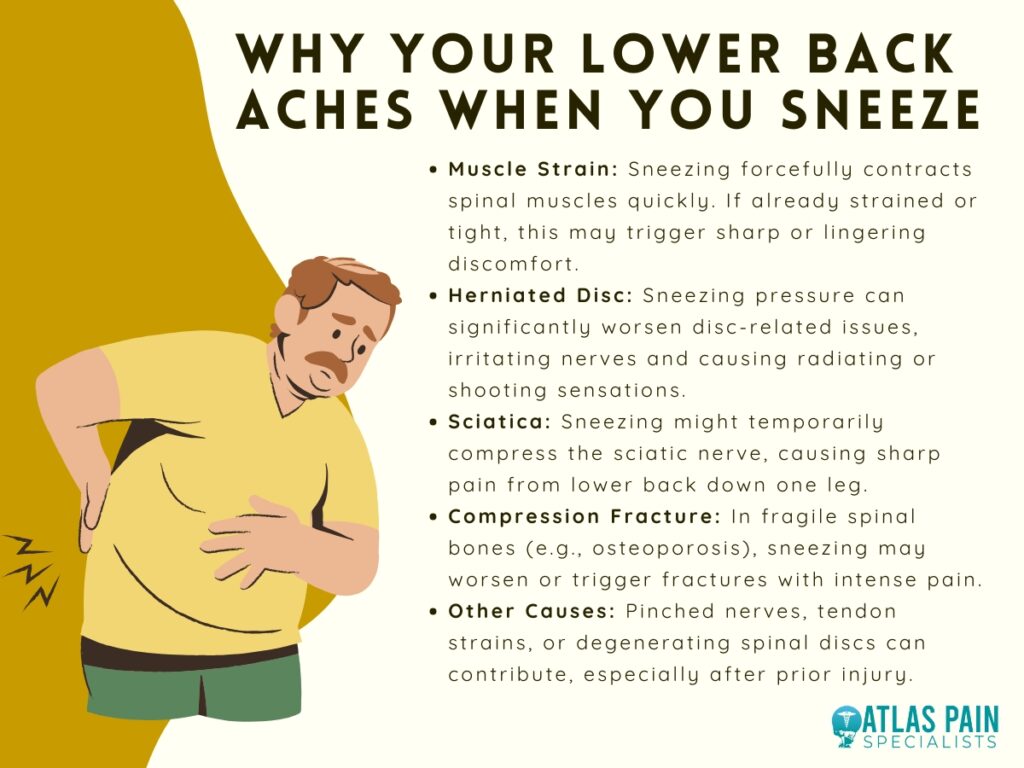

Back Hurts When I Sneeze: Is It Normal or a Sign of Something More?
Sneezing is a natural reflex, but when it triggers sudden back pain, it can leave you wondering if something’s wrong. For some, it’s a quick twinge that fades instantly. For others, it’s a sharp jolt that lingers or radiates through the lower back.
While occasional discomfort may simply be a result of muscle tension, consistent or severe pain could point to underlying issues like a herniated disc or nerve compression. In this article, we’ll explore why your back might hurt when you sneeze, what it could mean, and when it’s time to seek medical attention for lasting relief.
Why Does Your Back Hurt When You Sneeze?

If you’ve ever let out a sneeze and felt a sudden pain shoot through your back, you’re not alone. It might feel odd or even alarming, but it’s surprisingly common. Understanding why it happens can help you know whether it’s just a muscular reaction or a sign of something more serious, especially if similar pain occurs during other reflexes like coughing
Sneezing involves a rapid contraction of multiple muscles, especially in your chest, abdomen, and back. This action puts temporary pressure on your spine and surrounding structures. If there's already an issue with your back, that forceful motion can make it worse or suddenly bring pain to the surface.
Let’s explore the most common causes of back pain triggered by sneezing:
Muscle Strain
Muscle strain is one of the most common reasons for back pain during a sneeze. When you sneeze, your back muscles contract abruptly. If those muscles are already tight, weak, or overused, the sudden movement can easily trigger discomfort. Even a minor pre-existing strain may become aggravated.
In some cases, sneezing may cause the muscles to spasm. This can result in a sharp or stabbing pain that lasts for a few seconds or lingers longer depending on the severity of the strain. If you sit for long hours, have poor posture, or recently lifted something the wrong way, or even woken up with stiffness that doesn't fully go away.
Herniated or Bulging Disc
Your spine is made up of vertebrae cushioned by discs that act as shock absorbers. These discs have a soft inner core and a tougher outer layer. If the inner material bulges out or slips, it can press against nearby nerves.
Sneezing temporarily increases pressure along the spine. If you already have a herniated disc, that extra force can push the disc further against the nerve, leading to a sharp, sudden pain. Some people experience radiating pain down the back, hips, or legs, along with numbness or tingling, especially if degenerative disc disease is also present.
Pain caused by a herniated disc tends to worsen with movements such as bending, coughing, or sneezing.
Sciatica
Sciatica refers to pain caused by irritation or compression of the sciatic nerve, which runs from the lower back down each leg. When you sneeze, the sudden pressure can compress this nerve even more.
If you notice a sharp, shooting pain that travels from your lower back into your leg, you may be dealing with sciatica. Other symptoms include tingling, numbness, or burning sensations that follow the nerve’s path. This kind of pain is often one-sided and may get worse with sitting, standing for long periods, or sudden movements like sneezing.
Vertebral Compression Fracture
A vertebral compression fracture is a break in the bones of the spine, usually caused by weakened bones due to conditions like osteoporosis. In these cases, a forceful sneeze can actually cause a fracture or make an existing one more painful.
This type of pain is often sudden, sharp, and localized. It may feel worse when standing, moving, or sneezing, and it usually doesn’t go away quickly. Older adults or those with known bone density issues should be particularly cautious if they experience this type of pain.
Other Possible Causes
While muscle strain, disc issues, sciatica, and fractures are the main culprits, other factors could be involved.
A ligament or tendon strain around the spine could be irritated during sneezing, especially if there’s a history of overuse or injury. Degenerative disc disease, which happens as discs wear down with age, can also make the spine more vulnerable to pressure-related pain. In some cases, pinched spinal nerves caused by inflammation or structural misalignment can cause sharp, localized or radiating pain during a sneeze.
When Is Back Pain From Sneezing a Sign of Something More?
Sneezing is a normal reflex, but when it’s followed by a jolt of back pain, it can feel alarming. While many people experience occasional discomfort that quickly fades, recurring or severe pain could point to an underlying issue that requires attention. Knowing when to be concerned can help you take the right steps toward relief.
Mild Discomfort Is Usually Harmless
In most cases, back pain during sneezing is caused by muscle strain. This kind of discomfort is typically mild and short-lived. You might feel a quick twinge in the lower or mid-back, especially if you’ve been sitting for long periods, have poor posture, or recently lifted something heavy.
This kind of pain is generally due to tight or overworked muscles reacting to the forceful contraction caused by sneezing. The good news is that muscle-related back pain often resolves on its own with a little rest, light stretching, and basic home care like warm compresses or over-the-counter pain relievers.
If your pain disappears shortly after the sneeze and doesn’t affect your ability to move or go about your day, there’s usually no need for concern.
When Pain Becomes More Than Just a Twinge
While occasional mild discomfort is normal, more intense or persistent back pain during sneezing could be a warning sign of a deeper problem. Conditions like a herniated disc or sciatica may cause pain that is sharp, radiating, or difficult to ignore.
A herniated disc occurs when the inner material of a spinal disc pushes out and puts pressure on surrounding nerves. Sneezing creates a burst of pressure along the spine, which can make the pain worse or trigger it altogether. This may feel like a sharp, stabbing pain in the lower back that sometimes travels down to the hips, buttocks, or legs.
Sciatica is another common issue linked to sneezing-related pain. It happens when the sciatic nerve becomes compressed or irritated. If you feel a shooting pain down one leg, tingling, or numbness after sneezing, it might be due to pressure on this nerve. The pain is often one-sided and may worsen with prolonged sitting or standing.
Signs It’s Time to See a Doctor
Back pain from sneezing deserves closer attention if it comes with other symptoms or doesn’t go away. Consider consulting a healthcare professional if:
- You experience sharp or radiating pain that goes down the leg or arm
- You feel numbness, tingling, or weakness in your limbs
- The pain lasts long after the sneeze or keeps coming back
- You have trouble standing, walking, or moving normally
- The pain is worsening or disrupting daily life
These signs may suggest that nerves are involved or that there’s a structural issue in the spine that needs medical evaluation. Diagnostic imaging like an MRI or CT scan can help pinpoint the cause and guide treatment.
What to Do If Your Back Hurts When You Sneeze
Feeling back pain when you sneeze can be both surprising and uncomfortable. While it’s often linked to something minor like a muscle strain, repeated or intense pain may suggest an underlying issue. Here’s what you can do to manage the discomfort and prevent further complications.
- Let the Sneeze Out: As tempting as it might be, avoid holding in sneezes. Suppressing a sneeze increases internal pressure and can make back pain worse. It’s safer for your spine to let the sneeze out naturally, even if you brace yourself gently during the motion.
- Maintain Good Posture: Poor posture puts unnecessary stress on your spine and muscles. Whether you’re sitting, standing, or walking, focus on keeping your back straight, shoulders relaxed, and head aligned with your spine. Over time, maintaining proper posture can reduce the risk of back pain during sudden movements like sneezing.
- Strengthen Your Core: Your core muscles support your spine. When they’re weak, your back takes on more strain. Incorporate core-strengthening exercises such as planks, pelvic tilts, or light yoga stretches into your routine. A strong core helps stabilize your body and absorb the impact of sudden actions.
- Use Simple Home Remedies: If the pain is mild, home care can offer relief. Start with a short period of rest to avoid aggravating the injury, especially if it began after sleeping in an awkward position. Apply a heat or ice pack to the affected area to reduce inflammation and soothe tension. Over-the-counter anti-inflammatory medications like ibuprofen can help reduce pain and swelling. Gentle stretching may also release tight muscles and prevent spasms.
- Know When to Seek Help: If the pain persists, worsens, or is accompanied by symptoms like numbness, tingling, or muscle weakness, consult a healthcare provider. These signs may point to issues like a herniated disc, sciatica, or nerve compression that require professional assessment.
- Explore Treatment Options: Depending on the cause, treatment may involve physical therapy to restore strength and mobility, pain management techniques such as guided exercises or injections, or more advanced solutions like minimally invasive procedures or surgery. Early intervention often leads to better outcomes.
Why Does My Back Hurt When I Breathe?
Sometimes it’s the smallest actions, like a sneeze, that shine a light on something deeper going on with our bodies. If back pain shows up during such a quick reflex, it’s worth paying attention. Whether it’s muscular tension or something affecting the spine or nerves, understanding the source is the first step toward feeling better.
But sneezing isn’t the only ordinary movement that can cause unexpected discomfort. If you’ve ever taken a deep breath and felt a sharp pain in your back, you’re not imagining it. Let’s explore that next in Why Does My Back Hurt When I Breathe?
About Dr. Sean Ormond



